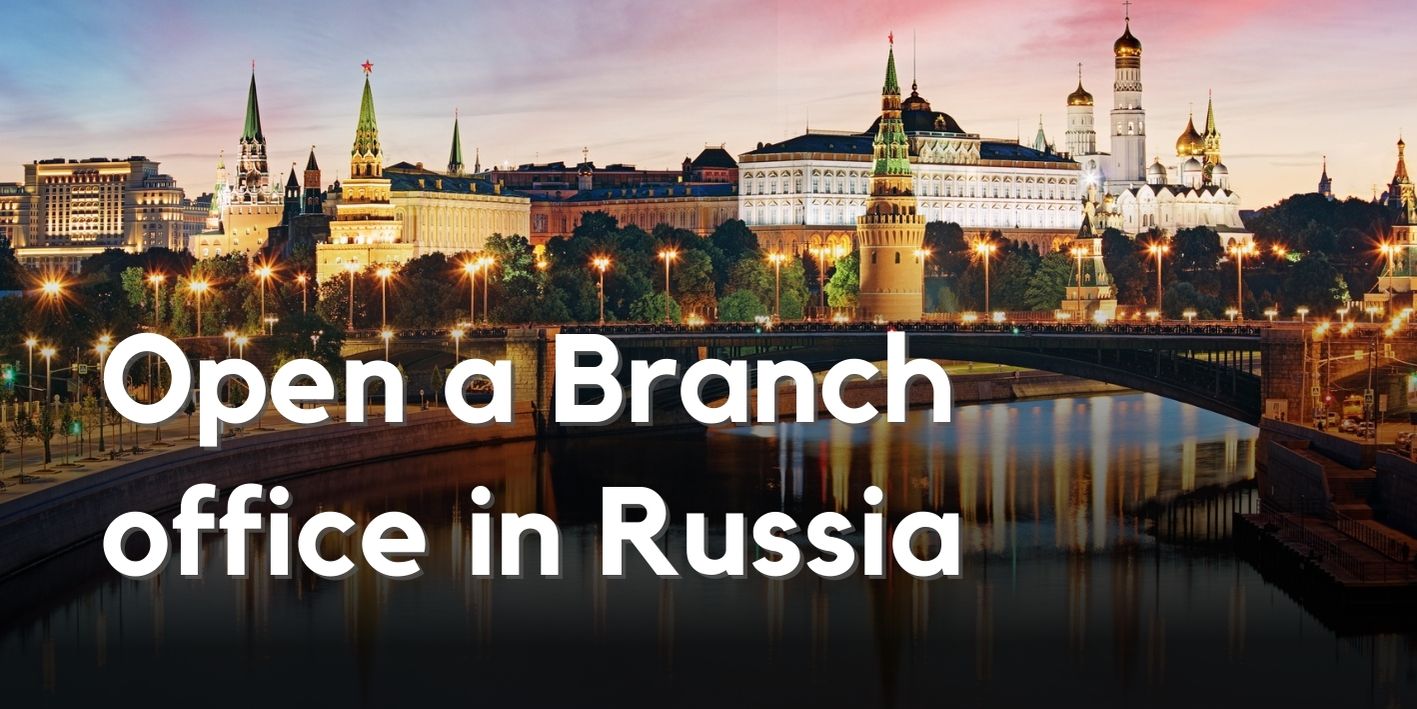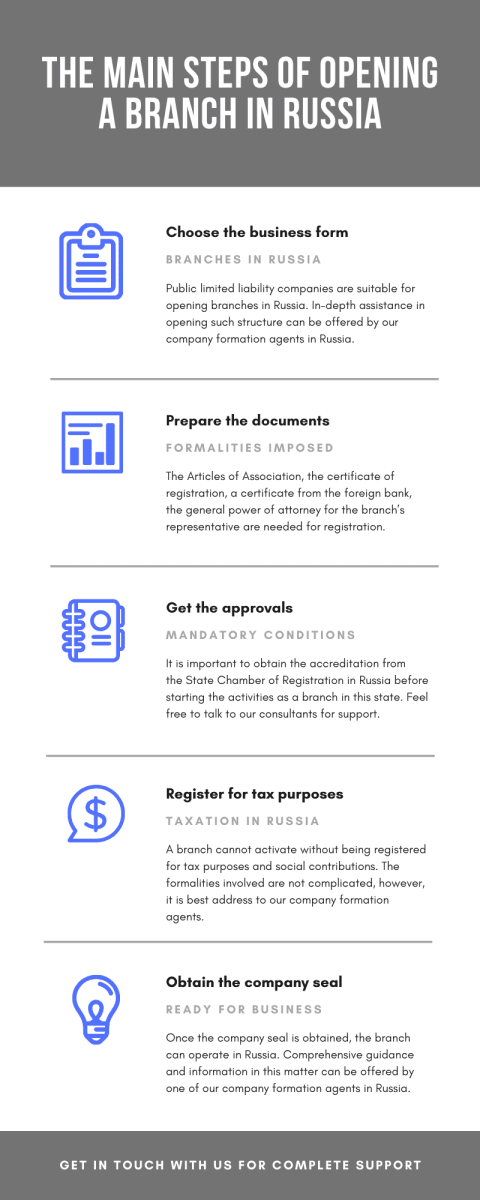The Russian branches are chosen by the companies that prospect the Russian market before taking the decision of opening a limited liability company or a public limited liability company. The liability for the branch’s actions belongs to the foreign company and the branch can take very few decisions without the consent of it. One of our company formation agents in Russia can give complete support and assistance for opening a branch in Russia.
| Quick Facts | |
|---|---|
| Applicable legislation |
For foreign countries |
|
Best used for |
– banking, – insurance, – financial activities |
|
Minimum share capital |
No |
| Time frame for the incorporation (approx.) |
Around 8 weeks |
| Management |
Local |
| Legal representative required |
Yes |
| Local bank account |
Yes |
| Independence from the parent company | Dependent on the parent company |
| Liability of the parent company | Full liability on the branch office's debt and obligations |
| Corporate tax rate | 15% |
| Possibility of hiring local staff | Yes |
| Required documents for incorporation |
– decision of opening a branch in Russia, – certificate of incorporation of the parent-company, – extract from foreign trade register, – power of attorney, – tax certificate |
|
Notarized Russian translation solicited (YES/NO) |
YES |
|
Other local registration |
A branch must be registered with: – tax authorities, – pension fund, – social security, – medical insurance fund, – State Committee |
| VAT reports for branches in Russia | Submitted every month |
| Can I hire foreign workers for a branch in Russia? (YES/NO) |
YES |
| Documents solicited for foreign employees |
Work permits |
| Can I develop other activities too with a branch in Russia? |
No, branches in Russia must carry out only the operations of the foreign company. |
| Best structure for branches in Russia |
Limited liability company (OOO) |
| Patent for business activities of a branch in Russia |
If applicable |
| Registration authority | Russian Registration Chamber |
| Accessing the local market |
Russia is the largest country in the world and foreign investors can easily access dedicated markets, depending on the business activities of their branches. |
| Registered Office Requirements |
Lease contract or owned property in Russia |
| Costs of opening a branch in Russia |
Varied fees linked to the business formation and registration with the relevant authorities |
| Standard VAT in Russia |
20% |
| Why work with our Russian agents? |
– experience in company formation, – personalized services, – affordable costs, – professionalism |
Legal requirements for opening a branch in Russia in 2024
There is an obligation to receive an accreditation from the State Chamber of Registration by the branches before starting the operations in Russia in 2024. The accreditation can be also received from the Chamber of Trade and Commerce or various Ministries of the Russian Government. There is an accreditation tax that has to be paid before registration at the State Chamber of Registration and a state duty that must be acquitted. For registration of a branch in Russia, it’s advisable to consult a lawyer because of the large number of documents that have to be deposited. The below information and documents are necessary in order to register a branch with the State Registration Chamber by the parent company:
- the foundation deeds and the company’s charter,
- the certificate of incorporation,
- the certificate of registration,
- an extract from the foreign trade register where the company is registered (or the certificate of good standing),
- the decision to open a branch in Russia,
- the internal rules of the branch,
- a certificate from the foreign bank, where the company is keeping its accounts regarding the good stand of it,
- the general power of attorney for the branch’s representative,
- the power of attorney for subscribing the documents in the name of the foreign company,
- tax certificate and the specific tax identification number,
- certificate of payment of the registration duty.
Incorporating a branch in Russia takes around 8 weeks, depending on the formalities and complexity. But in order not to be hit by the language barrier, we recommend that you contact one of our local specialists who can take care of all the procedures and paperwork required by law.
Moreover, registering a branch in Russia requires attention in terms of management that should be appointed in an official format. The Federal Tax Service in Moscow is the authority that accredits the branch in Russia, through its local agencies.
More about how to establish a branch in Russia in 2024 can be discussed with our specialists in company formation in Russia. You can also discover the following infographic:
What else you need to consider about branches in Russia
All the documents must be notarized and legalized in the country of origin and accompanied by a notarized Russian translation. After accreditation, the Russian branch must register with the Tax authorities, State Committee for Statistics, pension fund, social security fund and Obligatory Medical Insurance fund. No minimal share capital is requested for establishing a branch in Russia. The initial capital is delivered by the foreign company along with the assets. The management of a Russian branch is assured by a representative vested by the foreign company with powers granted by the power of attorney.
Financial statements of the branch established in Russia must be deposited every year at the tax inspectorate, while the VAT reports must be deposited monthly. Also, the balance sheet and the statements of losses and profits of the parent company must be presented to the State Chamber every year.
Another requirement imposed for branch incorporation in Russia is presenting information about the number of employees and positions in the firm. Such information is normally submitted to the Russian Chamber of Commerce and Industry.
Post branch registration formalities in Russia
Once the branch registration process has been completed, the company owner receives a series of certificates (PSRN, TIN, etc.), a notice of registration issued by the Pension Fund in Russia and one from the Social Insurance Fund, plus an information letter from the Chief Interregional Center of the Federal State Statistics Service in Russia.
The company seal, the decision of minutes, plus other documents will be delivered at the time the branch is established in Russia. All the formalities for branch registration in Russia can be handled by one of our company formation specialists in Russia.
Russian branches are obliged to develop specific operations as established by the foreign entity. This is how it differs from the subsidiary in Russia, which can also develop other types of activities.
It is good to note that authorities can refuse the incorporation of a branch in Russia by not giving accreditation in this sense. In most cases, the documents are the ones for which a refusal is issued. On the other side, branches registered in Russia will receive a document for inclusion in the Russian registry of companies.
We can also provide you with accounting services in Russia.
Who can establish branches in Russia in 2024?
Foreign company owners interested in doing business in Russia in 2024 can think of establishing their operations under the rules of a branch. We remind you that to have a branch in Russia, a limited liability company needs to be registered. The minimum share capital for opening an OOO or LTD in Russia is set at RUB 10,000 which needs to be deposited in a local bank account. It is good to know that at least one shareholder can open a limited liability company in Russia.
Here is a video presentation with information on this topic:
Business sectors for branches in Russia
The appealing business sectors of Russia allow foreign investors to set up any kind of operations as long as they respect the applicable laws. Most of the branches in Russia are found in the banking sector, IT, insurance, logistics, mining, agriculture, import & export, and many more. For more details about the types of investments in Russia, you can talk to one of our specialists.
Advantages of branches in Russia
Even if branches do not benefit from a level of independence as it is the case of subsidiaries, there are other kinds of benefits. For instance, Russian branch offices pay taxes only for the incomes generated in the country of establishment. More than that, branches registered in Russia are protected by the provisions of the double taxation treaties signed by Russia with a large number of states.
International investors who want to increase their portfolio in Russia can choose from the structures available in this country. Regardless of the option, the recommendation is to contact our accountants in Russia to ensure that you comply with the law in this regard. Accounting procedures such as payroll, bookkeeping, audits, or annual financial statements come under the attention of our specialists. They can offer the necessary services for the type of business you want to develop.
Are there any office facilities for branches in Russia?
Yes, foreign entrepreneurs can choose between a traditional office and a virtual one for their branches in Russia, depending on the business needs in this country, mentioning that a virtual office is a temporary solution. The difference between these two refers to the costs involved, meaning that a virtual office in Russia is subject to low expenditures. As for the facilities of a virtual office in Russia, we mention a prestigious business address, mail collection, a virtual assistant, the use of meeting rooms, collection of bank statements, and many more.
Differences between branches and subsidiaries in Russia
The main difference between branches and subsidiaries in Russia is the level of independence of each entity. Branches are completely dependent on the parent company, while a subsidiary has full independence that allows other activities too.
In terms of taxation, subsidiaries are obliged to register for all tax purposes and submit annual financial statements, while branches need to pay the taxes imposed only on the incomes generated in Russia. As for common advantages, both branches and subsidiaries are protected by the double taxation treaties signed by Russia.
Tax requirements for branches in Russia in 2024
The Russian law clearly stipulates that branches in Russia must respect a series of accounting requirements, such as bookkeeping, the submission of annual financial statements, audits, financial reporting, and many more. If you consider externalizing the accounting services for your branch in Russia, feel free to talk to one of our specialists in Russia and ask for support. Feel free to discuss all the aspects of opening branches in Russia in 2024 with our specialists.
Why make investments in Russia
Russia is a representative business destination and a very appreciated financial center among international players. The legislation related to foreign investments in Russia is extremely favorable to overseas investors who enjoy the same regime and business advantages as the domestic ones.
Except for the mining activities, the military sector, and the aerospace field in Russia, all industries are open to foreign investments. The real estate sector, the automotive, the manufacturing field, the pharmaceutical sector, construction and IT are among the preferred fields for foreign investors. Here are some interesting facts and figures about the economy and business in Russia:
- The total FDI stock for 2019 was around USD 464 billion;
- Russia ranked 28th out of 190 economies in the world, according to the 2020 Doing Business Report;
- The Netherlands, Cyprus, Ireland, Bermuda, and the Bahamas are the main investors in Russia;
- Most of the FDIs are directed to the extractive industry, energy, manufacturing, insurance, and real estate.
For opening a branch of your company in Russia in 2024, you may contact our company formation agents in Russia who will handle the incorporation procedure as soon as possible.



